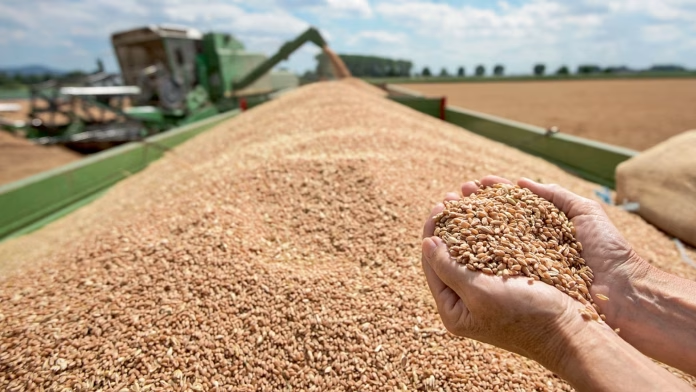Global prices for wheat and corn soared on Tuesday, driven by a significant event: the collapse of a major dam in Ukraine. This incident has renewed market fears surrounding the fragility of Ukraine’s ability to efficiently transport food to regions such as Africa, the Middle East, and parts of Asia. These concerns are further exacerbated by the ongoing war between Ukraine and Russia.
During early trading on Tuesday at the Chicago Mercantile Exchange, wheat prices witnessed a significant surge of 2.4%, reaching $6.39 per bushel. Additionally, the cost of corn rose by over 1%, settling at $6.04 per bushel, while oats experienced a gain of 0.73% to reach $3.46 per unit. It’s worth noting that prices had initially reached higher levels earlier in the day but later receded from those peaks.
The Kakhovka dam and hydroelectric power station, located in a region under Russian control along the Dnieper River, suffered extensive damage. This destructive event has sparked concerns regarding the potential disruption in Ukraine’s ability to provide affordable supplies of wheat, barley, corn, and sunflower oil to developing nations. These countries are already grappling with issues of hunger and soaring food prices, making the situation even more worrisome.
“Anytime this war shows signs of getting further escalated, there’s a lot of concern,” said Joseph Glauber, senior research fellow at the International Food Policy Research Institute. “Markets react to that.”
Both Ukraine and Russia play significant roles as agricultural suppliers, but the ongoing war between the two nations has severely impacted their ability to export agricultural goods. This disruption has further exacerbated a global food crisis, which has already been intensified by factors such as droughts and other challenges. While last year’s breakthrough agreements, facilitated by the U.N. and Turkey, initially allowed the movement of food through the Black Sea region, there have been setbacks that hindered the progress made.
Last year, Russia temporarily withdrew from the agreement and has since issued threats of doing so again. Furthermore, there are allegations that Russia has deliberately slowed down shipments from Ukraine. Adding to the uncertainty, Russia has agreed to renew the deal for only two-month intervals, further emphasizing the instability of the situation.
“People are going to be watching to see what happens with the agreement,” said Glauber, former chief economist at the U.S. Department of Agriculture. “This reminds everyone that it’s not just pro forma, that this could be a very serious development if indeed the agreement is broken.”
The southern region of Ukraine, where the dam rupture occurred, is home to vast agricultural fields. While the collapse of the dam has posed a threat to the crops in the affected areas, it is important to note that less wheat has been planted in that specific vicinity. This is primarily due to the proximity of the region to the ongoing conflict, leading to a larger portion of wheat cultivation taking place in other, relatively safer areas.
As a consequence of the collapse, there is a looming threat to drinking water supplies. Officials have expressed concerns about the potential for an environmental catastrophe, citing instances of oil leakage from the dam machinery as well as the substantial flooding caused by the incident. The combination of these factors raises serious alarms regarding the environmental impact of the collapse.
Andrey Sizov, Managing Director of Black Sea agricultural markets research firm SovEcon, said the dam collapse looked “like a big escalation with dire consequences and huge headline risk.”
“This could be just the start of the bull run,” Sizov wrote on Twitter early Tuesday.
After a strong rally in wheat futures overnight and early Tuesday, the momentum began to wane as the day unfolded. By approximately 3 p.m. ET, the price of wheat had dipped to $6.27 per bushel.
Following Russia’s invasion of Ukraine, food commodity prices, including wheat and vegetable oil, reached record highs. However, the subsequent Black Sea grain deal has contributed to a decline in prices. Despite this relief in prices, the impact has not yet trickled down to the markets, grocery stores, and kitchen tables where consumers can truly benefit from the decreased costs.
Citi commodities analysts called the dam breach a “reminder of lingering inflationary risk in the goods market.”
According to analysts, it is possible for temporary price increases to occur in response to significant news events, such as the collapse of the dam. These events can trigger short-term fluctuations in prices, reflecting the immediate market reactions to the news.
But circumstances are key — and expectations for food exports from Ukraine will likely “continue to diminish as we recognize that Ukrainian production will continue to be severely impaired because of the war,” said Joe Janzen, Assistant Professor at University of Illinois Urbana-Champaign’s College of Agricultural, Consumer and Environmental Sciences.
The supply of grain Ukraine is able to export is 40% lower than it was two years ago, Glauber said.





